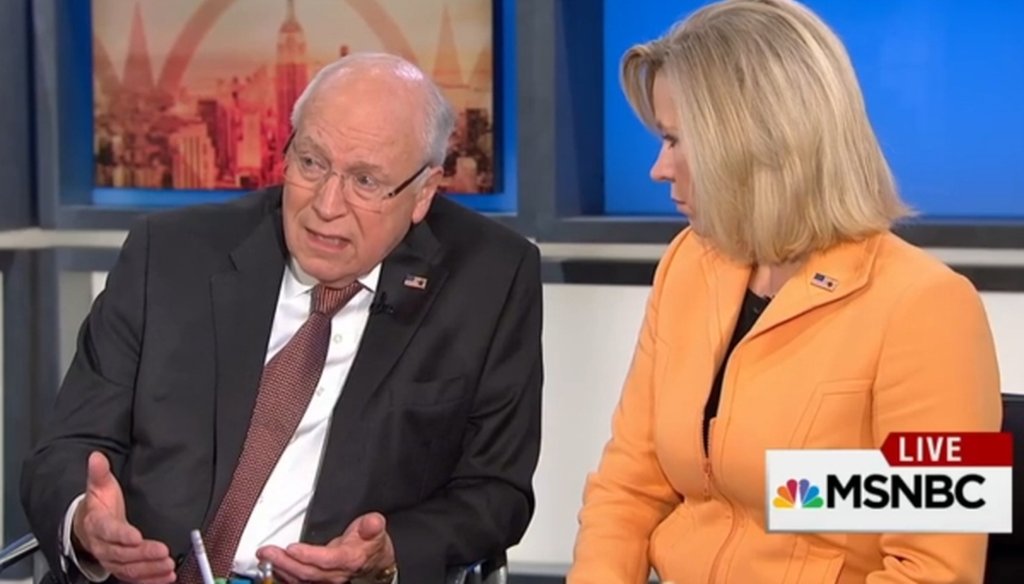Stand up for the facts!
Our only agenda is to publish the truth so you can be an informed participant in democracy.
We need your help.
I would like to contribute

Former Vice President Dick Cheney and his daughter Liz Cheney appeared on MSNBC's "Morning Joe" on Sept. 2, 2015.
Enactment of the nuclear deal with Iran may now be a fait accompli, with enough Democratic senators having announced their support to prevent Republicans from derailing the agreement in the Senate. But that doesn’t mean the squabbling over the agreement is over.
On the Sept. 2, 2015, edition of MSNBC’s Morning Joe, former Vice President Dick Cheney, a foe of the deal, and Secretary of State John Kerry, one of its chief architects, sat for back-to-back interviews. We checked one claim from each of them.
Kerry rejected the claim that the agreement "sunsets," thus allowing Iran the relatively unfettered ability to proceed with building a nuclear weapon.
"No, it never sunsets," Kerry said. "There's no sunset in this agreement."
On the one hand, Kerry’s vigorous denial that any sunsets exist "in this agreement" is not entirely accurate.
As Kerry himself subsequently points out, a number of provisions of the agreement expire over time. Several provisions last for 10 years, including a limit of 5,060 operating centrifuges and curbs on research and development on advanced centrifuges. Other provisions last for 15 years, including a variety of caps on uranium enrichment, international inspector access in no more than 24 days, and prohibitions on new heavy-water reactors and reprocessing. Meanwhile, continuous surveillance of centrifuge production areas would last for 20 years, while continuous surveillance of uranium mines and mills would last for 25 years.
On the other hand, critics of the deal are wrong when they suggest that the agreement all but disappears after these expirations.
While a number of the particularly intrusive provisions will lapse after 10, 15, 20 or 25 years, Iran will still be bound -- permanently -- by other curbs on its ability to produce a nuclear weapon.
Iran must comply with the Nuclear Non-Proliferation Treaty that it signed in 1974. This commits Iran to not pursuing nuclear weapons. It must also ratify the stricter curbs contained in the "Additional Protocol," which expanded the types of sites inspectors could visit on short notice. Iran signed the protocol in 2003 but quit adhering to it three years later and has never ratified it. The agreement also demands that Iran implement "modified Code 3.1," which requires the country to notify the International Atomic Energy Agency when it decides to build a nuclear facility, rather than six months before introducing nuclear material, and to keep the agency informed on changes to designs of existing nuclear sites.
So Kerry was right that the agreement as a whole does live on, and scrutiny of Iran’s nuclear ambitions will continue indefinitely under both earlier agreements and certain provisions within the nuclear deal. But his statement glosses over the fact that a number of key elements of the agreement expire in 10, 15, 20 or 25 years. On balance, we rated the claim Half True.
As for Cheney, he said that one of the agreement’s fundamental flaws is it allows Iran to continue to enrich uranium.
"When they allow Iran to continue with enrichment, they are breaking one of the key requirements with respect to the nonproliferation treaty where enrichment has been limited to basically the weapons states," Cheney said. "And here we are sanctioning giving enrichment capability to the Iranians."
However, the Nuclear Nonproliferation Treaty, or NPT, was designed in part to allow countries to pursue the peaceful use of atomic energy while preventing them from turning their nuclear materials and technology into weapons.
"Former Vice President Cheney is incorrect in asserting that the NPT prohibits enrichment by non-nuclear weapon states," said Daryl Kimball, executive director of the Arms Control Association. "Article IV of the treaty does not ‘allow it,’ nor does it prohibit it.’ "
Brian Finlay, managing director of the Stimson Center, a defense-policy group in Washington, also found Cheney’s words problematic.
"He is correct to say that France, the United States, Russia, China and the United Kingdom all have enrichment capacities," Finlay said. "But so do Germany, Japan, the Netherlands -- definitely not nuclear weapons states."
Ultimately, while it’s debatable whether the treaty grants nations the right to enrich, if a non-nuclear nation wants to enrich uranium for peaceful purposes, the treaty doesn’t stand in the way. We rated the claim False.
Our Sources
See original Truth-O-Meter items.










































